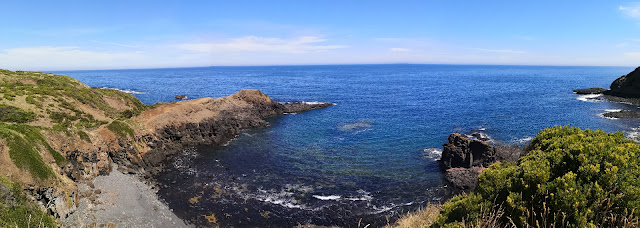There is a region of countryside south of Melbourne called the Mornington Peninsula which hills, seaside and farms make for pleasant day trips especially in summer.
墨爾本以南有一帶叫莫寧頓半島(Mornington Peninsula),還保留了一片郊野和農莊,而且有山有水,夏天作一日遊還是不錯的。There are plenty of places for enjoying sceneries with the sea and even a dip in the water. Cape Schanck at the southernmost tip of the peninsula offers one of the best views in the region. There is a functioning lighthouse atop one of the cliffs, connecting to a rocky beach at the foot of the cliffs via a trail and boardwalk. A cool breeze provided a welcome relief from the afternoon heat on the day of visit. The dominant colour of the beach is the charcoal black stretching from the cliff faces to the rocks by the sea. The beach at Cape Schanck faces Bushrangers Bay, which is connected to Cape Schanck by a walking track on top of the cliffs lining the sea there.
想看海甚至下水消暑的,地點多的是,半島最南端Cape Schanck海角的風景要算數一數二。海角的崖上豎立一所仍在運作的燈塔,有小徑連接木梯和板道通往崖下的石灘,一邊走一邊有海風不斷迎面吹來,所以就算烈日當空下走也覺舒服(說來那天氣温不算熱得驚人,到海邊走走清涼一下是不錯的選擇)。石灘的主色是碳黑,由海畔的石至遠一點的崖,令我覺得是某種火山石的樣子。海角與Bushrangers Bay遙遙對望,崖上有遠足徑連接,時間充裕的話走走,我想應該不錯。
More photos 更多相片 - https://www.instagram.com/p/CZHITievjrl/
Another rocky beach not too far away can be found at Flinders Blowhole, about 13 km by road (about 13 minutes drive). The beach there offers a view not seen at Cape Schanck: a veil of water vapour as the waves hit the rock heat up by the sun.
離Cape Schanck大約13公里路程的Flinders Blowhole,也是個石灘,也是一片黑色,但那裡應該因為石的表面較熱(受太陽直射而非地熱),所以海水沾到石上瞬間便變成蒸汽,有如一片輕紗。(我這個鏡粉倒是很快便想起那句很洗腦的「焫焫焫焫焫焫着」!)
Water vaporising at Flinders Blowhole 如輕紗的蒸汽
Plenty of sandy beaches line the coast of Mornington Peninsula, for example at West Head in the town of Flinders and the main beach in the town of Mornington. From Mornington one can spend a whole day (or even more) beach hopping along the northern coast of the peninsula, and there's bound to be one to your liking.
想由石灘轉換環境至沙灘,選擇則比比皆是,例如在小鎮Flinders的West Head長長的沙灘和Mornington靠近鎮中心的主灘。其實沿着半島北岸,小鎮和海灘一個接一個,總會有一處讓你喜歡的。
West Head
Mornington
My wife and I undertook a day trip to the peninsula, and no trip is complete without good food. The Red Hill region in the peninsula boasts of an extensive choice from the farms, wineries and restaurants. We chose to enjoy an apple meal at Mock Red Hill apple yard, and tasted its range of apple ciders together with its apple pie. We continued our fruit indulgence at Sunny Ridge strawberry farm where we were pleasantly surprised by its Strawberry Temptation, with scoops of ice cream and sorbet made from fresh strawberries topping a glass of fresh strawberries. At Mornington we ordered a pizza from a restaurant accredited by The True Neapolitan Pizza Association (Associazione Verace Pizza napoletana, AVPN), hoping for an authentic taste but was slightly disappointed with the burnt base.
我和太太到半島一日遊,看好風景之餘也不離吃好東西。半島中的Red Hill區,是農莊、酒莊和餐廳的集中地,豐儉由人,我和太太中午時先光顧了Mock Red Hill的蘋果園,品嚐該園出處的蘋果汽酒和蘋果餡餅,再到Sunny Ridge紅草莓園,點了一杯紅草莓冰淇淋,令太太想起台中超人氣宮原眼科冰淇淋,每口冰淇淋,明顯吃得出一種新鮮紅草莓味道,再配上新鮮紅草莓,可以一滿吃紅草莓的慾望。至於在Mornington鎮本身餐廳選擇不少,我們就特意光顧一家有名、獲意大利拿坡里薄餅協會認證的薄餅店,可惜餅烤得稍焦,不然造法是挺正宗的。
We hope to visit other parts of the Mornington Peninsula at another time, especially the beaches along its northern shore!
莫寧頓半島的北岸也有其特色,希望將來有機會一遊!











Comments